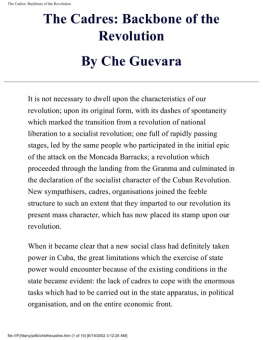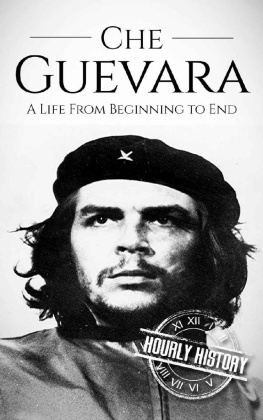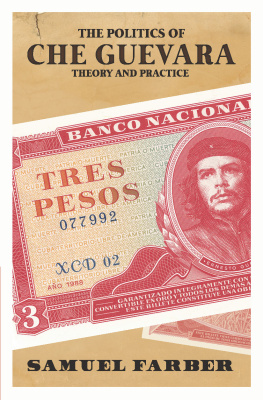Che Guevara - The Cadres: Backbone of the Revolution
Here you can read online Che Guevara - The Cadres: Backbone of the Revolution full text of the book (entire story) in english for free. Download pdf and epub, get meaning, cover and reviews about this ebook. year: 2011, genre: Politics. Description of the work, (preface) as well as reviews are available. Best literature library LitArk.com created for fans of good reading and offers a wide selection of genres:
Romance novel
Science fiction
Adventure
Detective
Science
History
Home and family
Prose
Art
Politics
Computer
Non-fiction
Religion
Business
Children
Humor
Choose a favorite category and find really read worthwhile books. Enjoy immersion in the world of imagination, feel the emotions of the characters or learn something new for yourself, make an fascinating discovery.
- Book:The Cadres: Backbone of the Revolution
- Author:
- Genre:
- Year:2011
- Rating:4 / 5
- Favourites:Add to favourites
- Your mark:
- 80
- 1
- 2
- 3
- 4
- 5
The Cadres: Backbone of the Revolution: summary, description and annotation
We offer to read an annotation, description, summary or preface (depends on what the author of the book "The Cadres: Backbone of the Revolution" wrote himself). If you haven't found the necessary information about the book — write in the comments, we will try to find it.
The Cadres: Backbone of the Revolution — read online for free the complete book (whole text) full work
Below is the text of the book, divided by pages. System saving the place of the last page read, allows you to conveniently read the book "The Cadres: Backbone of the Revolution" online for free, without having to search again every time where you left off. Put a bookmark, and you can go to the page where you finished reading at any time.
Font size:
Interval:
Bookmark:
The Cadres: Backbone of the Revolution
The Cadres: Backbone of the
Revolution
By Che Guevara
It is not necessary to dwell upon the characteristics of our revolution; upon its original form, with its dashes of spontaneity which marked the transition from a revolution of national liberation to a socialist revolution; one full of rapidly passing stages, led by the same people who participated in the initial epic of the attack on the Moncada Barracks; a revolution which proceeded through the landing from the Granma and culminated in the declaration of the socialist character of the Cuban Revolution.
New sympathisers, cadres, organisations joined the feeble structure to such an extent that they imparted to our revolution its present mass character, which has now placed its stamp upon our revolution.
When it became clear that a new social class had definitely taken power in Cuba, the great limitations which the exercise of state power would encounter because of the existing conditions in the state became evident: the lack of cadres to cope with the enormous tasks which had to be carried out in the state apparatus, in political organisation, and on the entire economic front.
The Cadres: Backbone of the Revolution
Immediately after the taking of power, administrative assignments were made "by rule of thumb"; there were no major problems
there were none because as yet the old structure had not been shattered. The apparatus functioned in its old, slow, lifeless, broken-down way, but it had an organisation and with it sufficient co-ordination to maintain itself through inertia, disdaining the political changes which came about as a prelude to the change in the economic structure.
The 26th of July Movement, deeply impaired by the internal struggles between its right and left wings, was unable to dedicate itself to constructive tasks; and the Partido Socialista Popular (Popular Socialist Party), because it had undergone fierce attacks, and because for years it was an illegal party, had not been able to develop intermediate cadres to cope with the newly arising responsibilities.
When the first state interventions took place in the economy, the task of finding cadres was not very complicated, and it was possible to select them from among many people who had the minimum basis for assuming positions of leadership. But with the acceleration of the process which took place after the nationalisation of the North American enterprises and later of the large Cuban enterprises, a veritable hunger for administrative technicians manifested itself. At the same time, an urgent need was felt for production technicians because of the exodus of many who were attracted by better positions offered by the imperialist The Cadres: Backbone of the Revolution
companies in other parts of the Americas or in the United States itself. The political apparatus had to make an intense effort, while engaged in the tasks of building, to pay ideological attention to the masses who joined the revolution eager to learn.
We all performed our roles as well as we could, but it was not without pain and anxieties. Many errors were committed by the administrative section of the Executive; enormous mistakes were made by the new administrators of enterprises who had overwhelming responsibilities on their hands, and we committed great and costly errors in the political apparatus also, an apparatus which little by little began to fall into the hands of a contented and carefree bureaucracy, totally separated from the masses, which became recognised as a springboard for promotions and for bureaucratic posts of major or minor importance.
The main cause of our errors was our lack of a feeling for reality at a given moment; but the tool that we lacked, that which blunted our ability to perceive and which was converting the party into a bureaucratic entity and was endangering administration and production, was the lack of developed cadres at the intermediate level. It became evident that the policy of finding cadres was synonymous with the policy of going to the masses, to establish contact anew with the masses, a contact which had been closely maintained by the revolution in the first stages of its existence.
But it had to be established through some type of mechanism which would afford the most beneficial results, both in feeling the The Cadres: Backbone of the Revolution
pulse of the masses and in the transmission of political orientation, which in many cases was only being given through the personal intervention of Prime Minister Fidel Castro or other leaders of the revolution.
From this vantage point, we can ask ourselves what a cadre type is.
We should say that a cadre person is an individual who has achieved sufficient political development to be able to interpret the extensive directives emanating from the central power, make them his, and convey them as orientation to the masses, a person who at the same time also perceives the signs manifested by the masses of their own desires and their innermost motivations.
He is an individual of ideological and administrative discipline, who knows and practices democratic centralism and who knows how to evaluate the existing contradictions in this method and to utilise fully its many facets; who knows how to practice the principle of collective discussion and to make decisions on his own and take responsibility in production; whose loyalty is tested, and whose physical and moral courage has developed along with his ideological development in such a way that he is always willing to confront any conflict and to give his life for the good of the revolution. Also, he is an individual capable of self-analysis, which enables him to make the necessary decisions and to exercise creative initiative in such a manner that it won't conflict with discipline.
The Cadres: Backbone of the Revolution
Therefore the cadre person is creative, a leader of high standing, a technician with a good political level, who by reasoning dialectically can advance his sector of production, or develop the masses from his position of political leadership.
This exemplary human being, apparently cloaked in difficult-to-achieve virtues, is nonetheless present among the people of Cuba, and we find him daily. The essential thing is to grasp all the opportunities that there are for developing him to the maximum, for educating him, for drawing from each personality the greatest usefulness and converting it into the greatest advantage for the nation.
The development of a cadre individual is achieved in performing everyday tasks; but the tasks must be undertaken in a systematic manner, in special schools where competent professors - examples in their turn to the student body - will encourage the most rapid ideological advancement.
In a regime that is beginning to build socialism, you could not imagine a cadre that does not have a high political development, but when we consider political development we must not only take into account apprenticeship to Marxist theory; we must also demand responsibility of the individual for his acts, a discipline which restrains any passing weaknesses, and which will not conflict with a big dose of initiative; and constant preoccupation with all the problems of the revolution. In order to develop him, The Cadres: Backbone of the Revolution
we must begin by establishing the principles of selectivity among the masses; it is there that we must find the budding personalities, tested by sacrifice or just beginning to demonstrate their stirrings, and assign them to special schools; or when these are not available, give them greater responsibility so that they are tested in practical work.
In this way, we have been finding a multitude of new cadres who have developed during these years; but their development has not been an even one, since the young companeros have had to face the reality of revolutionary creation without the adequate orientation of a party. Some have succeeded fully, but there were others who could not completely make it and were left midway, or were simply lost in the bureaucratic labyrinth, or in the temptations that power brings.
Next pageFont size:
Interval:
Bookmark:
Similar books «The Cadres: Backbone of the Revolution»
Look at similar books to The Cadres: Backbone of the Revolution. We have selected literature similar in name and meaning in the hope of providing readers with more options to find new, interesting, not yet read works.
Discussion, reviews of the book The Cadres: Backbone of the Revolution and just readers' own opinions. Leave your comments, write what you think about the work, its meaning or the main characters. Specify what exactly you liked and what you didn't like, and why you think so.











